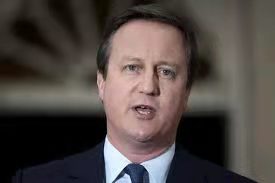



第10节
This has been consistently interpreted as applying not to the peoples but rather to the states and institutions compounded by a European court of justice that has consistently supported greater centralization.
We understand and respect the right of others to maintain their commitment to this goal. But for Britain – and perhaps for others – it is not the objective.
And we would be much more comfortable if the treaty specifically said so, freeing those who want to go further, faster, to do so, without being held back by the others.
So to those who say we have no vision for Europe, I say we have.
We believe in a flexible union of free member states who share treaties and institutions and pursue together the ideal of co-operation. To represent and promote the values of European civilization in the world. To advance our shared interests by using our collective power to open markets. And to build a strong economic base across the whole of Europe.
And we believe in our nations working together to protect the security and diversity of our energy supplies. To tackle climate change and global poverty. To work together against terrorism and organized crime. And to continue to welcome new countries into the EU.
This vision of flexibility and co-operation is not the same as those who want to build an ever closer political union – but it is just as valid.
My third principle is that power must be able to flow back to member states, not just away from them. This was promised by European leaders at Laeken a decade ago.
It was put in the treaty. But the promise has never really been fulfilled. We need to implement this principle properly.
So let us use this moment, as the Dutch prime minister has recently suggested, to examine thoroughly what the EU as a whole should do and should stop doing.
第11节
In Britain we have already launched our balance of competences review – to give us an informed and objective analysis of where the EU helps and where it hampers.
Let us not be misled by the fallacy that a deep and workable single market requires everything to be harmonized, to hanker after some unattainable and infinitely level playing field.
Countries are different. They make different choices. We cannot harmonize everything. For example, it is neither right nor necessary to claim that the integrity of the single market, or full membership of the European Union requires the working hours of British hospital doctors to be set in Brussels irrespective of the views of British parliamentarians and practitioners.
In the same way we need to examine whether the balance is right in so many areas where the European Union has legislated including on the environment, social affairs and crime.
Nothing should be off the table.
My fourth principle is democratic accountability: we need to have a bigger and more significant role for national parliaments.
There is not, in my view, a single European demos.
It is national parliaments, which are, and will remain, the true source of real democratic legitimacy and accountability in the EU.
It is to the Bundestag that Angela Merkel has to answer. It is through the Greek parliament that Antonis Samaras has to pass his government's austerity measures.
It is to the British parliament that I must account on the EU budget negotiations, or on the safeguarding of our place in the single market.
Those are the parliaments which instil proper respect – even fear – into national leaders.
We need to recognize that in the way the EU does business.
My fifth principle is fairness: whatever new arrangements are enacted for the eurozone, they must work fairly for those inside it and out.
第12节
That will be of particular importance to Britain. As I have said, we will not join the single currency. But there is no overwhelming economic reason why the single currency and the single market should share the same boundary, any more than the single market and Schengen.
Our participation in the single market, and our ability to help set its rules is the principal reason for our membership of the EU.
So it is a vital interest for us to protect the integrity and fairness of the single market for all its members.
And that is why Britain has been so concerned to promote and defend the single market as the eurozone crisis rewrites the rules on fiscal co-ordination and banking union.
These five principles provide what, I believe, is the right approach for the European Union.
So now let me turn to what this means for Britain.
Today, public disillusionment with the EU is at an all-time high. There are several reasons for this.
People feel that the EU is heading in a direction that they never signed up to. They resent the interference in our national life by what they see as unnecessary rules and regulation. And they wonder what the point of it all is.
Put simply, many ask "why can't we just have what we voted to join – a common market?"
They are angered by some legal judgements made in Europe that impact on life in Britain. Some of this antipathy about Europe in general really relates of course to the European court of human rights, rather than the EU. And Britain is leading European efforts to address this.
There is, indeed, much more that needs to be done on this front. But people also feel that the EU is now heading for a level of political integration that is far outside Britain's comfort zone.
【关联阅读】
温馨提示:横线象征链接。点击横线,直通链接。
 |
 |
|
学 习 辅 导 |
咨 询 热 线 |